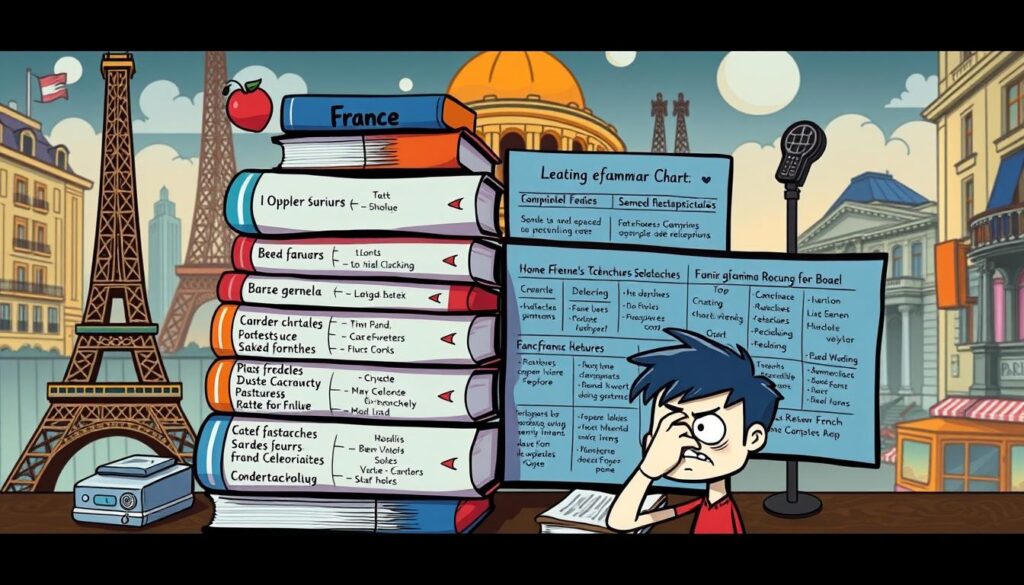Exploring languages opens up cultural insights and enriches the mind. When comparing French and German, you’re in for an exciting ride. French is spoken by 267 million worldwide, while German has 155 million speakers. Picking the right guide is key for success in learning. Aligning your goals with these languages’ aspects is vital. Remember, following good learning strategies is essential for success.
French is the diplomatic language in 29 countries, spreading across continents. German is crucial in Europe’s biggest economy. Both languages are valuable: French for diplomacy and German for business. Your choice might depend on your preference for French culture or German’s economic advantages.
German and French share cultural ties due to their border. French may seem easier, with its similarities to English and simpler grammar. German has clear pronunciation but complex grammar, making it a challenge for some. Consider your learning preferences and goals when choosing.
Exploring the Similarities of French and German Languages
Learning a new language might seem tough. But similarities between French and German help, especially for English speakers. Both have a big European background, making them some of the easiest languages for English speakers to learn. Let’s find out what makes these languages similar and easy to pick up.
Common Indo-European Roots
French and German come from different families, Romance and Germanic. Yet, they both trace back to the Indo-European family. This means they have a common ancestor. It gives them related structures and logic.
The Latin Alphabet and English Speakers’ Advantage
The Latin alphabet is another similarity. This is great news, making them some of the easiest languages for English speakers to learn. English speakers know the Latin script. So, they don’t have to learn a new way of writing, making starting easier.
Cognates and Shared Vocabulary
French and German have lots of cognates – words that are alike with the same meaning. For example, ‘family’ in English becomes ‘famille’ in French and ‘Familie’ in German. This is because of years of cultural sharing. It makes learning them much simpler. Cognates help learners quickly boost their vocab in both languages.
Interested in French? Here’s a thorough look at its global role and why it’s worth learning.
The language learning tips and tricks we talked about show the benefits of shared roots, the Latin alphabet, and cognates. Both French and German are good choices for English speakers. They offer a journey with many familiar signs along the way.
| Language | Speakers Globally | Official in Countries | Global Influence |
|---|---|---|---|
| French | 300 million | 29 | High (UN, EU, Red Cross) |
| German | 155 million | 6 plus regions in other countries | Moderate (Central European influence) |
Breaking Down the Differences: French vs. German
Choosing between French and German means noticing their unique language features. These differences could guide you to the fastest way to learn a language, based on your needs.
Romance vs. Germanic Linguistic Heritage
French and German have different roots. French comes from Latin and is a Romance language. German, however, is part of the Germanic languages. This key difference affects how easy or hard it is to learn each language. French is popular among those in diplomacy or international relations.
The Pronunciation and Sound Distinctions
French sounds melodic with its nasal sounds and silent letters, making it complex. On the other hand, German pronunciation is clearer and uses phonetics, including unique sounds like umlauts (ä, ö, ü). While German’s exactness can be hard at first, it often has more predictable rules than French.
Grammatical Structures and Noun Cases
French and German grammar are quite different. French is simpler with two noun genders and a more steady word order. German has three genders and four cases: nominative, accusative, dative, and genitive. These cases can confuse beginners but offer sentence flexibility once mastered.
When comparing French and German skills, think about which language matches your learning style and goals. Whether for fun, study, or work, know these language differences.
Also, culture affects how languages are used. German is valuable in engineering and the auto industry. French is key in art, fashion, and food.
Your choice between French and German depends on your aims and where you’ll use the language. Both open doors to rich histories, cultures, and economies, promising a fulfilling learning experience.
Which is Easy to Learn: French or German?
Is it easy to learn French or German? Both languages have their unique challenges. Your background plays a big role in what you find hard or easy.
French is known worldwide, making it important for diplomacy and culture. It’s easier for some because of its simple verb forms and fewer genders. German, however, might appeal to those who like clear rules. Its pronunciation matches how it’s written.
When picking between French and German, think about your goals. If you’re into global diplomacy or culture, French is a great choice. But if you love engineering, science, or philosophy, German could be better. It has lots of resources in these fields.
| Aspect | French | German |
|---|---|---|
| Geographical Reach | Spoken widely in 31 African countries and parts of Europe | Centrally used in Germany, and parts of Eastern Europe |
| Grammatical Genders | Two (Masculine and Feminine) | Three (Masculine, Feminine, and Neuter) |
| Notable Usage | Cultural and diplomatic realms | Science, engineering, and philosophical discourses |
| Career Opportunities | Valuable in international business and diplomatic services | Essential for scientific research and academic pursuits in Europe |
| Pronunciation Difficulty | More complex due to silent letters | More straightforward, as spoken words closely match the written form |
What’s best in language learning comparison depends on you. Think about where you’ll use the language. French and German both have benefits, depending on your goals and interests. Choosing what’s easy to learn French or German depends on what fits you best.
Analyzing Practical Considerations in Language Learning
Stepping into the world of languages requires practical thinking. Whether you aim for French or German, your choice should reflect your interests and goals. Cultural connections, career paths, and preferred locations matter in your decision.
Cultural Influence and History
The culture and history of a language deeply enrich the learning journey. French is celebrated for its cultural richness, seen not only in France but in 29 countries globally. Its role in global diplomacy is significant due to its Latin roots. French’s predictable pronunciation system makes it easier for English speakers to learn.
It ranks among the 15 easiest languages for its similarities to English in alphabet and sentence structure.
Geographical Dominance and Usage
Geographical reach is essential; French is spoken by around 267 million people worldwide, with numbers expected to increase. In contrast, German has over 134 million speakers, mainly in Central Europe. It connects you to Europe’s largest economy, opening up opportunities in business and innovation.
Choosing between French and German depends on where you wish to travel and the extent of your interactions.
Economic Opportunities and Career Benefits
Considering careers, French and German lead to different opportunities. French is ideal for those drawn to fashion, culinary arts, or diplomacy. Meanwhile, German is key in engineering, technology, and business fields. It’s crucial to consider how these languages apply to your.
This guide helps you think deeper about your language choice. Exploring further comparisons may help you decide. Remember, passion and practicality should guide your language learning to make it rewarding and useful.


